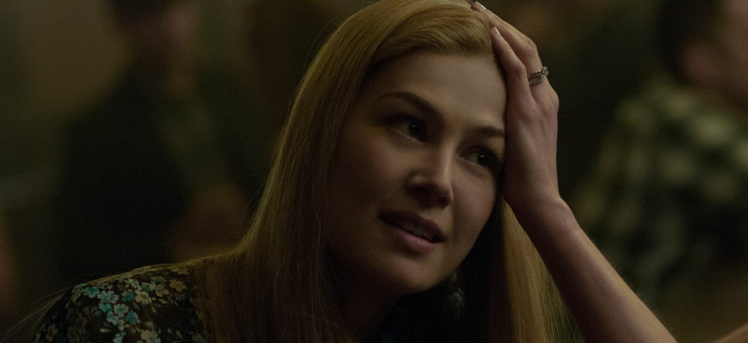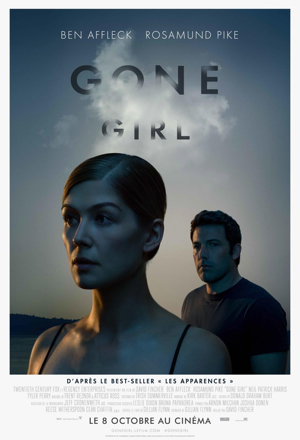Movies

New Releases • A-D • E-H • I-P • Q-Z • Articles • Festivals • Interviews • Dark Knight • Indiana Jones • John Wick • MCU

Amazing Amy (Rosamund Pike)
Photo: Twentieth Century Fox
Gone Girl
Directed by David Fincher
Rated R
After regurgitating pop news media and stumbling through the first surprise twist, Gone Girl finally goes for the jugular and finds itself in the third act.
Housewives of Branson
Gone Girl is good, but most of it lacks David Fincher's flair, the edgy and crafty presentation style which figured heavily in earlier movies like Fight Club and Seven, a style that set those movies apart as uniquely Fincher. This one's more like The Social Network for Psychos.

For too long it feels like a drama better suited for the small screen, were it not for the star power of Ben Affleck (Argo) and Rosamund Pike (Jack Reacher), who, by the way, steals the show and delivers an absolute knock-out, complex performance.
It's a dark, twisted tale by Gillian Flynn, who wrote the screenplay based upon her own hugely popular novel. Nick Dunne (Affleck) meets an attractive young lady, Amy (Pike), at a party. That night it's wham, bam, and a crash course to the altar begins.
Several years into their marriage, the couple, both professional writers living out east, pack it all up and move to Missouri to help care for Nick's ailing mother. Emotionally and financially, things head south for the couple, both of whom lose their jobs thanks to the economic downturn. Nick stays busy teaching part-time and managing a dive bar, simply called The Bar, with his sister, Margo (Carrie Coon, HBO's The Leftovers). As for Amy, well, her life is kind of a mystery.
Raising Amy
Actually, Amy's life has always been dramatic, but not always of her own doing. Rather bizarrely, while raising Amy, her parents wrote a series of (hugely popular) children's books about a girl called Amazing Amy. She is everything their own real Amy is not, an uber-achiever extraordinaire living an exciting, cutesy life toward which children everywhere would aspire.
When real, grown-up Amy disappears, all eyes turn to Nick. Things start to play out like the real-life Scott Peterson case in California; Nick's infidelities and passionless behaviors make him all the more suspect, and things only get worse when rumors sprout up about Amy being pregnant at the time of her disappearance.
As for Amy, her journey in some respects parallels that of Arizona's real super-psycho, Jodi Arias.
To drive it all home, and to add to the feeling much of Gone Girl would feel more comfortable being watched from a couch, is the over-abundant use of fictional cable news talking heads who all-too-obviously satirize the obnoxious conclusion jumping by the likes of Nancy Grace and Jeanine Pirro.
Man-ip-u-la-tion
The satiric elements clearly call out the oftentimes vapid media manipulation of local news and its subsequent ascension to the national stage, followed by the equally vapid and uninformed entry into pop culture. Witness, then, Nick's bar suddenly becoming a hot spot for selfies in the wake of Amy's disappearance.
American culture can be a sad, sordid state of affairs, and Gone Girl does show some smarts in the subtler observations, particularly as seen through Amy's critical analysis of the world, sharply documented in her well-written diary.
But Gone Girl, as a movie, is itself also a work of manipulation. The best example of that, without giving away any specific twist, shows a bloodied Amy following a particularly brutal scene. She's taken to the hospital. She's put into hospital scrubs. But, aside from her face, blood is still obviously all over her from the neck down. She's taken back home. And it's only then when she finally showers - amid a dramatic conversation - and sheds the blood.
Really? Sure, there's a nice visual and symbolic element to the sequence, but it's also ludicrous. The movie reveals its own manipulations, but at least that's amid the movie's ramped-up run to a conclusion worthy of conversations over post-movie Java, or maybe something stronger. In those final 45 minutes, Gone Girl finally sheds the TV spinoff vibe and feels like a real, genuine movie with its own identity.
Reality Chick
The knee-jerk reaction is to say Gone Girl is anti-marriage. The lead characters certainly are, but they also amount to the equivalent of a new-millennium edition of Fatal Attraction. Trade in the bunnies for more expensive toys.
But maybe the lesson is to stay away from chicks on the bookstore go-team, or girls immortalized in children's books written by their parents. Ladies, stay away from guys who are college teachers with an eye for fresh cheese or whose sole income comes from an unpopular dive bar co-managed with his sister.
Ultimately, Gone Girl is about the collision of two people pumped and primed with volatilities and vulnerabilities.
The best evidence to counter the anti-marriage argument, though, is the simple fact that Gillian Flynn has a vivid imagination and is, in reality, a happily married woman.
For now.
• A gently edited version was published at MovieHabit.com.


